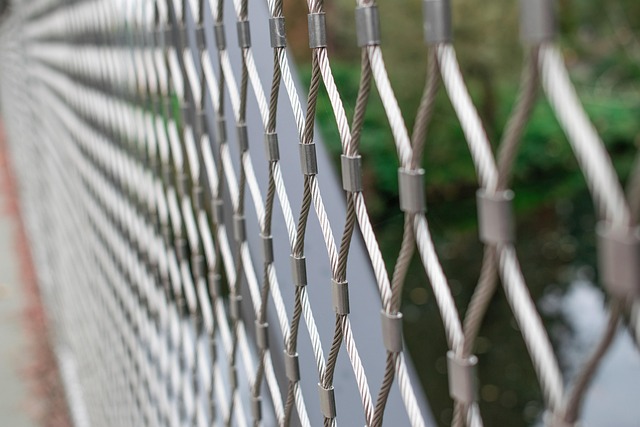In New Bedford, Massachusetts, a wooden fence can enhance your property’s aesthetics and security. This comprehensive guide delves into the intricacies of installing a durable and aesthetically pleasing fence. We explore the diverse needs and benefits of professional installation, providing insights on choosing the ideal fence type for your space. From preparation to post-installation care, our step-by-step process ensures a seamless experience. Additionally, we navigate local regulations and permits, empowering you with the knowledge to embark on this transformative project.
- Understanding Wooden Fence Needs in New Bedford
- Benefits of Choosing a Professional Installer
- Key Factors for Selecting the Right Fence Type
- The Installation Process: Step-by-Step Guide
- Post-Installation Care and Maintenance Tips
- Local Regulations and Permits for Fence Installation
Understanding Wooden Fence Needs in New Bedford
In New Bedford, Massachusetts, understanding the specific wooden fence needs is essential due to the region’s diverse climate and varied property types. Homeowners often seek fences that can withstand harsh winters and hot summers, providing both functionality and aesthetic appeal. The city’s mix of residential neighborhoods, businesses, and industrial areas requires fences that are durable, secure, and customizable to fit different landscapes. Wooden fences in this area need to be treated to resist rot, insect damage, and the elements, ensuring they last for years while maintaining their beauty.
Local regulations and property lines also play a significant role in fence installation. Homeowners should consider the legal requirements for fence height, materials, and placement to ensure compliance and maintain good relations with neighbors. Professional wooden fence installation services in New Bedford are crucial in navigating these complexities, providing expert advice, and using high-quality materials to meet both functional and aesthetic expectations.
Benefits of Choosing a Professional Installer
When considering a wooden fence installation for your New Bedford property, choosing a professional installer offers numerous advantages. Expert installers possess the necessary skills and experience to ensure your new fence is not only aesthetically pleasing but also functional and long-lasting. They can provide valuable insights into local regulations and permit requirements, saving you time and potential legal issues.
Professional installers use high-quality materials and employ proper techniques for a secure and durable fence installation. This expertise minimizes the risk of structural issues or unsightly misalignments that could arise from DIY attempts. By entrusting your project to pros, you gain peace of mind knowing your investment is in capable hands, resulting in a beautifully installed wooden fence that enhances your property’s value and security.
Key Factors for Selecting the Right Fence Type
When considering a wooden fence installation, several key factors come into play when selecting the right type for your New Bedford property. The primary consideration is the purpose of the fence; whether it’s for privacy, security, or aesthetic appeal. Each fence style serves a unique function—from solid picket fences offering complete privacy to chain-link fences providing robust security.
Climate and local conditions are another essential factor. In Massachusetts, weather can be unpredictable, so choosing a durable wood species suitable for outdoor conditions is vital. Treatment options like sealing or staining can also enhance the fence’s longevity. Additionally, consider your property’s layout and surrounding landscape. Fences with specific designs or heights might better suit certain areas, ensuring both functionality and visual harmony.
The Installation Process: Step-by-Step Guide
The installation process for a wooden fence begins with a thorough site assessment and preparation. This includes measuring the perimeter, marking the outline, and ensuring the ground is cleared and even. The next step involves setting the posts, which are strategically placed to provide sturdy support. These posts are concreted into the ground to ensure their stability.
Once the posts are secure, the fence panels are attached. There are various panel styles, from traditional pickets to slats, each offering different levels of privacy and aesthetic appeal. The panels are fastened to the posts using brackets or nails, creating a strong and durable structure. Finally, the entire fence is inspected for any issues, ensuring it meets safety standards and providing the desired security and beauty to the property.
Post-Installation Care and Maintenance Tips
After your wooden fence is installed, proper care and maintenance will ensure its longevity and beauty. Regular cleaning is essential; use a soft brush or cloth to remove dirt, dust, and debris, especially after storms or high winds. Avoid using harsh chemicals, as they can damage the wood. A light coat of water-based preservative or sealant every few months will protect your fence from the elements.
Keep an eye out for any loose or damaged boards and promptly replace them to prevent further deterioration. Inspect the posts and rails for signs of rot or insect infestation, treating any issues early on. Regular trimming of nearby trees and shrubs will also help maintain your fence’s appearance and ensure it serves its intended purpose for many years to come.
Local Regulations and Permits for Fence Installation
When planning to install a wooden fence in New Bedford, Massachusetts, understanding local regulations and obtaining necessary permits is crucial before beginning construction. Each city or town has its own set of building codes and zoning laws that dictate various aspects of residential and commercial projects, including fence installation. These rules are designed to ensure safety, maintain property values, and preserve the aesthetic character of neighborhoods.
In New Bedford, homeowners or contractors must typically apply for a building permit from the local building department. The application process involves submitting detailed plans, specifications, and sometimes even a design review. Permits may be required for fences that encroach on public right-of-way, exceed certain height restrictions, or are part of a larger construction project. It’s essential to check with the New Bedford Building Department or relevant authority to understand the specific requirements, as regulations can vary based on property location and fence type.
